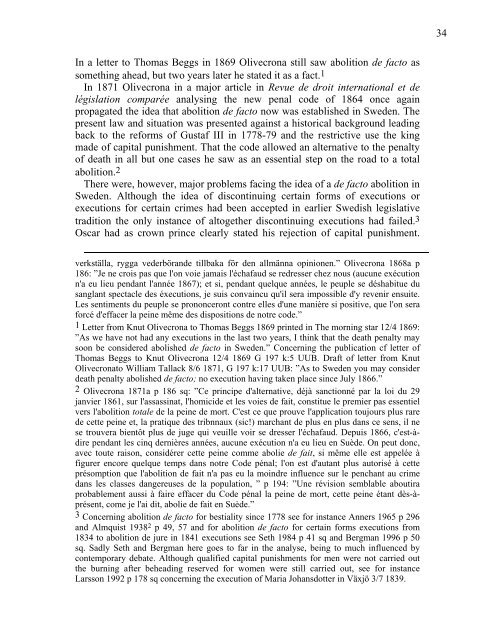Knut Olivecrona and his ”Om dödsstraffet”. - Figuras
Knut Olivecrona and his ”Om dödsstraffet”. - Figuras
Knut Olivecrona and his ”Om dödsstraffet”. - Figuras
You also want an ePaper? Increase the reach of your titles
YUMPU automatically turns print PDFs into web optimized ePapers that Google loves.
In a letter to Thomas Beggs in 1869 <strong>Olivecrona</strong> still saw abolition de facto as<br />
something ahead, but two years later he stated it as a fact.1<br />
In 1871 <strong>Olivecrona</strong> in a major article in Revue de droit international et de<br />
législation comparée analysing the new penal code of 1864 once again<br />
propagated the idea that abolition de facto now was established in Sweden. The<br />
present law <strong>and</strong> situation was presented against a <strong>his</strong>torical background leading<br />
back to the reforms of Gustaf III in 1778-79 <strong>and</strong> the restrictive use the king<br />
made of capital punishment. That the code allowed an alternative to the penalty<br />
of death in all but one cases he saw as an essential step on the road to a total<br />
abolition.2<br />
There were, however, major problems facing the idea of a de facto abolition in<br />
Sweden. Although the idea of discontinuing certain forms of executions or<br />
executions for certain crimes had been accepted in earlier Swedish legislative<br />
tradition the only instance of altogether discontinuing executions had failed.3<br />
Oscar had as crown prince clearly stated <strong>his</strong> rejection of capital punishment.<br />
verkställa, rygga vederbör<strong>and</strong>e tillbaka för den allmänna opinionen.” <strong>Olivecrona</strong> 1868a p<br />
186: ”Je ne crois pas que l'on voie jamais l'échafaud se redresser chez nous (aucune exécution<br />
n'a eu lieu pendant l'année 1867); et si, pendant quelque années, le peuple se déshabitue du<br />
sanglant spectacle des éxecutions, je suis convaincu qu'il sera impossible d'y revenir ensuite.<br />
Les sentiments du peuple se prononceront contre elles d'une manière si positive, que l'on sera<br />
forcé d'effacer la peine même des dispositions de notre code.”<br />
1 Letter from <strong>Knut</strong> <strong>Olivecrona</strong> to Thomas Beggs 1869 printed in The morning star 12/4 1869:<br />
”As we have not had any executions in the last two years, I think that the death penalty may<br />
soon be considered abolished de facto in Sweden.” Concerning the publication cf letter of<br />
Thomas Beggs to <strong>Knut</strong> <strong>Olivecrona</strong> 12/4 1869 G 197 k:5 UUB. Draft of letter from <strong>Knut</strong><br />
<strong>Olivecrona</strong>to William Tallack 8/6 1871, G 197 k:17 UUB: ”As to Sweden you may consider<br />
death penalty abolished de facto; no execution having taken place since July 1866.”<br />
2 <strong>Olivecrona</strong> 1871a p 186 sq: ”Ce principe d'alternative, déjà sanctionné par la loi du 29<br />
janvier 1861, sur l'assassinat, l'homicide et les voies de fait, constitue le premier pas essentiel<br />
vers l'abolition totale de la peine de mort. C'est ce que prouve l'application toujours plus rare<br />
de cette peine et, la pratique des tribnnaux (sic!) marchant de plus en plus dans ce sens, il ne<br />
se trouvera bientôt plus de juge qui veuille voir se dresser l'échafaud. Depuis 1866, c'est-àdire<br />
pendant les cinq dernières années, aucune exécution n'a eu lieu en Suède. On peut donc,<br />
avec toute raison, considérer cette peine comme abolie de fait, si même elle est appelée à<br />
figurer encore quelque temps dans notre Code pénal; l'on est d'autant plus autorisé à cette<br />
présomption que l'abolition de fait n'a pas eu la moindre influence sur le penchant au crime<br />
dans les classes dangereuses de la population, ” p 194: ”Une révision semblable aboutira<br />
probablement aussi à faire effacer du Code pénal la peine de mort, cette peine étant dès-àprésent,<br />
come je l'ai dit, abolie de fait en Suède.”<br />
3 Concerning abolition de facto for bestiality since 1778 see for instance Anners 1965 p 296<br />
<strong>and</strong> Almquist 1938 2 p 49, 57 <strong>and</strong> for abolition de facto for certain forms executions from<br />
1834 to abolition de jure in 1841 executions see Seth 1984 p 41 sq <strong>and</strong> Bergman 1996 p 50<br />
sq. Sadly Seth <strong>and</strong> Bergman here goes to far in the analyse, being to much influenced by<br />
contemporary debate. Although qualified capital punishments for men were not carried out<br />
the burning after beheading reserved for women were still carried out, see for instance<br />
Larsson 1992 p 178 sq concerning the execution of Maria Johansdotter in Växjö 3/7 1839.<br />
34






